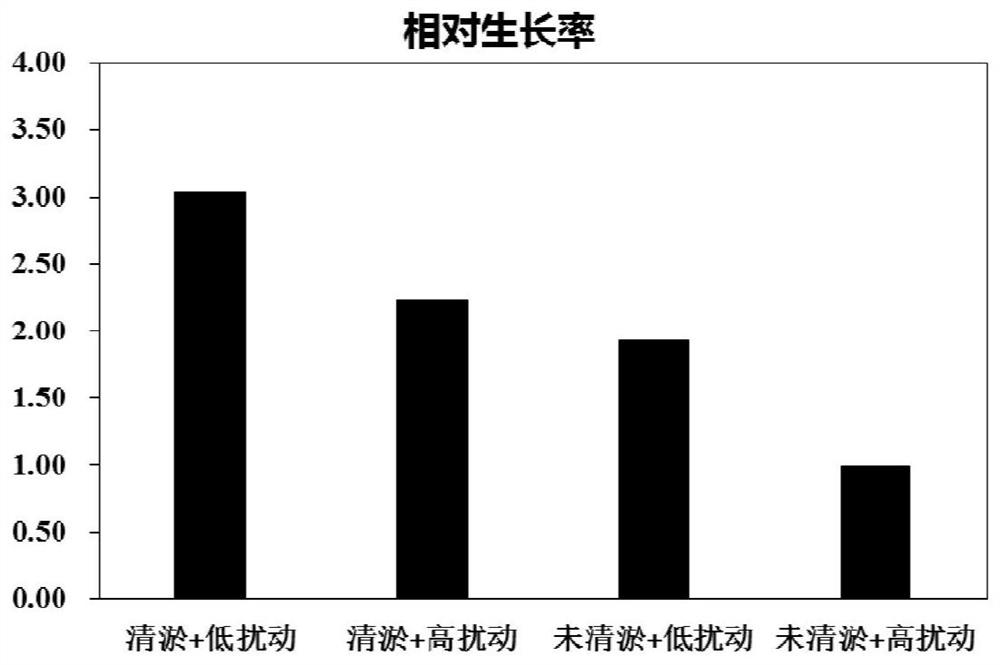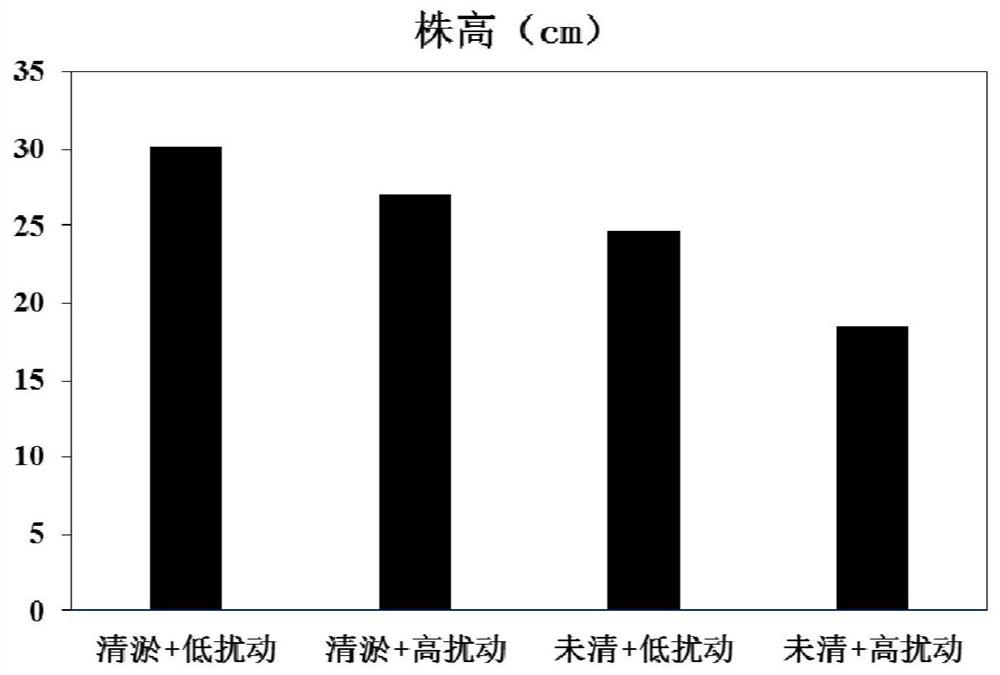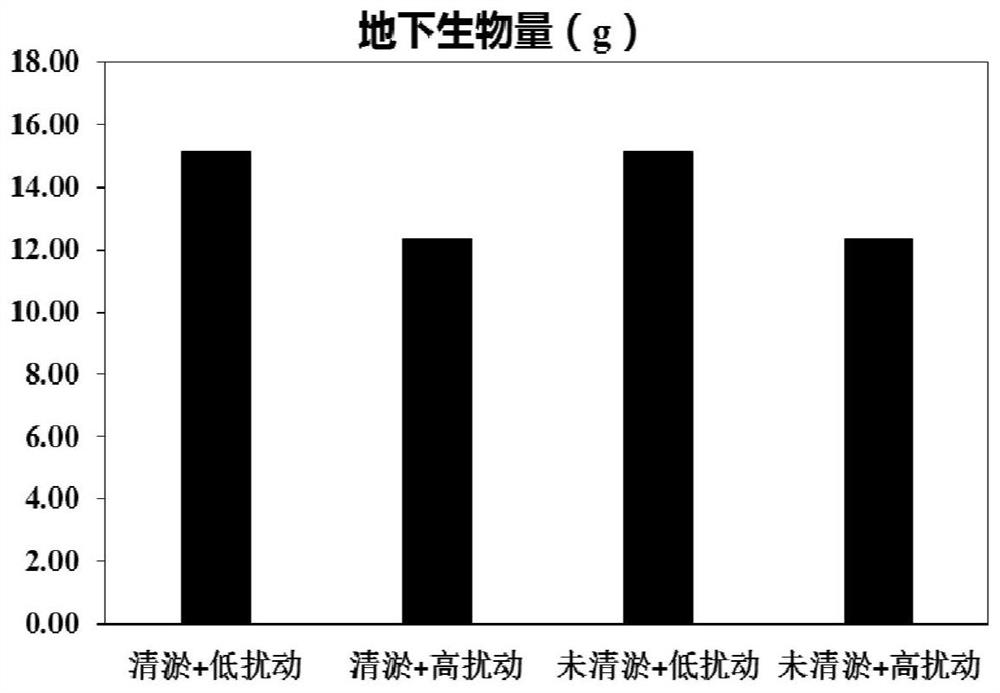A method for ecological restoration of submerged plants in urban lakes
A technology for submerged plants and ecological restoration, applied in botany equipment and methods, plant cultivation, plant protection, etc., can solve problems such as difficulty in restoring submerged plants, weak effect, cumbersome demolition work, etc.
- Summary
- Abstract
- Description
- Claims
- Application Information
AI Technical Summary
Problems solved by technology
Method used
Image
Examples
Embodiment 1
[0023] Embodiment 1 The impact of wind and waves and sediment on the growth of bitter grass
[0024] The experiment was conducted in an outdoor pond near East Taihu Lake from July 29 to August 26, 2013. There are two experimental factors, factor one: simulate the intensity of wind and wave disturbance in Taihu Lake, 3W wave pump (flow rate 0.4m / s), 6W wave pump (flow rate 0.8m / s). Factor 2: sediment after dredging (low water content of bottom mud); undredded sediment (high water content of bottom mud). Four treatments were designed in the experiment: low wind wave disturbance + dredged sediment, low wind wave disturbance + undredded sediment, high wind wave disturbance + dredged sediment, high wind wave disturbance + undredded sediment, 4 parallels for each treatment , 16 barrels in total. The two kinds of sediments (matrix) used in the experiment come from Meiliang Bay, Taihu Lake, one is dredged sediment and the other is undredged sediment. The sediment is used after bein...
Embodiment 2
[0027] Embodiment 2 Taking a city lake in Zhengzhou as an example, the effect of adopting the method of the present invention to ecologically restore submerged plants in a city lake with relatively high wind and waves is illustrated.
[0028] The water area of the target lake is 950,000 square meters, the water depth is 2 meters, and the transparency is 30cm.
[0029] Ecological restoration began in March 2014, and dredging and fish removal are being carried out;
[0030] In June of the same year, polyethylene mesh was used to divide the lake into nine sub-waters of about 100,000 square meters. The polyethylene mesh was 1 cm. Each sub-water was separated by 5 layers of mesh, and the distance between each mesh was 100 cm. After the omentum is laid out, the overall reduction of wind and waves is about 50%, and the transparency is increased to 75cm.
[0031] In early July, the water quality and lake flow indicators of each sub-water area, as well as the water content in the se...
Embodiment 3
[0043] Embodiment 3 Taking a city lake in Changsha as an example, the effect of adopting the method of the present invention to ecologically restore submerged plants in a city lake with relatively high wind and waves is illustrated.
[0044] The water area of the target lake is 310,000 square meters, the water depth is 2.5 meters, and the transparency is 40cm.
[0045] Ecological restoration began in April 2014, and dredging and fish removal are being carried out;
[0046] In June of the same year, the lake was divided into 6 sub-water areas of about 50,000 square meters by using polyethylene mesh. The polyethylene mesh is 3cm. Each sub-water area is separated by 10 layers of mesh, and the distance between each mesh is 500cm. After the omentum is laid out, the overall reduction of wind and waves is about 60%, and the transparency is increased to 80cm.
[0047] In early July, the water quality and lake flow indicators of each sub-water area, as well as the water content in the...
PUM
| Property | Measurement | Unit |
|---|---|---|
| transparency | aaaaa | aaaaa |
Abstract
Description
Claims
Application Information
 Login to View More
Login to View More - R&D
- Intellectual Property
- Life Sciences
- Materials
- Tech Scout
- Unparalleled Data Quality
- Higher Quality Content
- 60% Fewer Hallucinations
Browse by: Latest US Patents, China's latest patents, Technical Efficacy Thesaurus, Application Domain, Technology Topic, Popular Technical Reports.
© 2025 PatSnap. All rights reserved.Legal|Privacy policy|Modern Slavery Act Transparency Statement|Sitemap|About US| Contact US: help@patsnap.com



